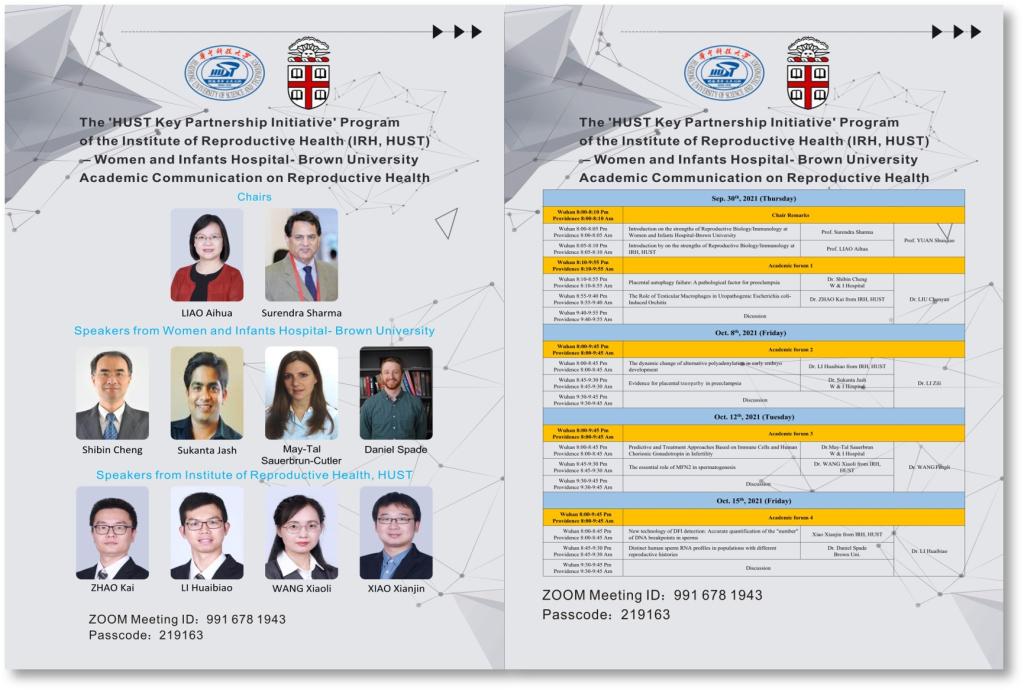From September 30th to October 15th, 2021, the academic communication between the Institute of Reproductive Health (IRH) at Tongji Medical College of HUST and Brown University on the “HUST Key Partnership Initiative” Program was successfully held. This activity was jointly organized by Professor LIAO Aihua, Dean of IRH, and Professor Surendra Sharma, Dean of the Reproductive Health Center of Biomedical Research Excellence of Brown University.


A total of 8 young talents, including associate Professor CHENG Shibin, assistant Professor Sukanta Jash, assistant Professor May-Tal Sauerbrun, assistant Professor Daniel Spade from Brown University, and associate Professor ZHAO Kai, associate Professor LI Huaibiao, associate Professor WANG Xiaoli and Professor XIAO Xianjin from IRH, were invited to give talks on the topic of reproductive immunology and reproductive biology.
On September 30th, Professor YUAN Shuiqiao from the IRH, hosted the opening ceremony. Professor Surendra Sharma introduced the advantages of reproductive biology/immunology at Women and Infants Hospital-Brown University. Professor LIAO Aihua introduced the background, development goals, and plans of the“HUST Key Partnership Initiative” program between the IRH, HUST and Brown University, and warmly welcomed all the participants. This academic exchange activity was held in four forums, each of which was shared an academic report by one speaker from both sides. After the reports, online discussions were conducted.
Dr. LIU Chunyan from the IRH hosted the first academic forum. Associate Professor CHENG Shibin from Brown University gave an excellent report on the pathological mechanism of abnormal placental autophagy in patients with early-onset preeclampsia entitled "Placental autophagy failure: A pathological factor for preeclampsia". Associate Professor ZHAO Kai from IRH gave a report entitled "The role of Testicular Macrophages in Uropathogenic Escherichia coli-Induced Orchitis", which described the microenvironment of the testicular immune system and how macrophages function in UPEC-induced orchitis.
On October 8th, Dr. LI Zili from the IRH hosted the second academic forum. Associate Professor LI Huaibiao gave a report entitled "The dynamic change of alternative polyadenylation in early embryo development". This report aroused great the interest of Professor Sharma, and he raised the following three questions to begin a lively discussion: (1) Do male and female embryos differ in the length of 3'UTR? (2) Do longer 3’-UTR offer excess binding sites for miRNA and control the overall integrity of mRNA? (3) Do hormones affect the expression of NUDT1 and CPSF6 in humans vs. mice? Subsequently, Sukanta Jash, assistant Professor from Brown University, made a report entitled "Evidence for placental tauopathy in preeclampsia". His laboratory found inspiration from the pathogenesis of Alzheimer’s disease and discovered the disease-causing protein Tau of Alzheimer’s disease, especially Cis P-Tau protein is enriched in the placenta of preeclampsia patients and Tau protein antibody may have a possibility to treat preeclampsia. This report aroused great interest of the participants about whether Cis P-Tau can be used as a diagnostic marker for preeclampsia. Professor Surendra Sharma also noted that he looks forward to furthering cooperation in this research.

On October 12th, associate Professor WANG Fengli from IRH hosted the third academic forum. Assistant Professor May-Tal Sauerbrun from Brown University gave a report entitled "Predictive and Treatment Approaches Based on Immune Cells and Human Chorionic Gonadotropin in Infertility", which discussed prediction of infertility by using human chorionic gonadotropin and immune cells. Associate Professor WANG Xiaoli, from IRH gave an academic report entitled "The essential role of MFN2 in spermatogenesis", and proposed relevant evidence that MFN2 enriches the mitochondrial-related endoplasmic reticulum membrane and regulates the morphology of the endoplasmic reticulum, which inspired an enthusiastic discussion.
On October 15th, Associate Professor LI Huaibiao from IRH hosted the fourth academic forum. Professor XIAO Xianjin, Director of the Transformation Center of IRH, gave an academic report entitled "New technology of DFI detection: Accurate quantification of the "number" of DNA breakpoints in sperms", and systematically introduced the new technology of DFI detection by his team. Then, assistant Professor Daniel Spade From Brown University gave an academic report entitled "Distinct human sperm RNA profiles in populations with different reproductive histories", showing us his research on two topics, one is about the effect of insecticide ingredients on the testicular development of fetal mice and the other is about the potential value of sperm RNA expression pattern in predicting male infertility.
After the reports, the organizers of this academic communication, Professor Surendra Sharma and Professor LIAO Aihua, respectively made concluding remarks, unanimously praising the success of the event, extending their appreciations for all the speakers and hosts for their devoted preparation and active participation, and wishing the both parties will have comprehensive and deep cooperation in the future. (Picture/Text: ZHANG Yiran and CAI Siying)
